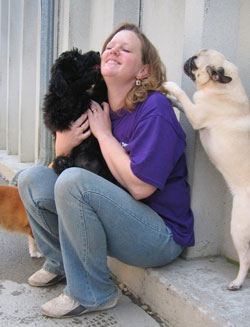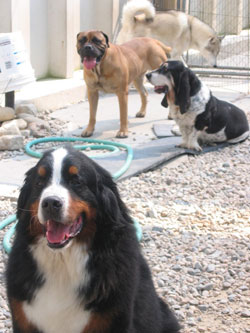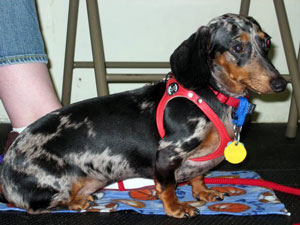It was dark and raining as Michelle Borelli left her office and began the drive home to Pepperell, Massachusetts. A technical writer at a software firm, Michelle was used to the 16-hour days—and the unfulfilling work. Lately she'd been thinking about making a change in her life, leaving high tech for something more warm and fuzzy—like working with dogs.

Michelle Borelli and daycare friends
Michelle had found two stray dogs recently and had provided them with loving shelter before their owners turned up. The experience had deeply affected Michelle. As a dog lover, she was getting a little fed up with careless pet owners. She started thinking about what she could do to help pet dogs stay safe and happy. She realized she wanted to work with dogs and make a difference in their lives by educating owners. Michelle and her husband were financially prepared to handle a career change, so the fantasy might actually be workable.
Driving down Interstate 495, Michelle saw something that looked like a deer in the road ahead. She slowed down to avoid the animal—which, upon closer inspection, was actually a large dog, running across the southbound lanes. Knowing that the dog would surely be run over if someone didn't save him, Michelle pulled into the adjacent rest stop.
An on-looking truck driver had the story. He told Michelle that he'd watched someone in a white van pull into the rest area, push the dog from the vehicle, and drive off.
Michelle was stunned by the news. She was also a little taken aback to have "found" her third stray in as many months, but determined to rescue the shepherd-Dane mix. The trucker offered Michelle the remnants of his Spam dinner, which she used to lure the frightened dog into her car—while nearly being run over herself in the process.
When she got home, Michelle and her husband tried to introduce the scared newcomer to their terrier through a fence, but the scene was violent. Michelle realized the dog couldn't stay. The next morning, she took him to a shelter.
To her dismay, shelter staff informed Michelle that on account of the dog's large size, he probably wouldn't be adopted. They'd likely just put him down in ten days. Having just risked her own life to rescue this animal, Michelle couldn't believe what she was hearing.
She knew there wasn't much time. Michelle went to her office and e-mailed the rescue story to her address book, in search of an adoptive family. When Michelle called the shelter the next day to see how the dog was doing, a shelter worker told her the phone had been ringing off the hook with calls from around the country in response to her e-mail plea. Within two days, the dog was adopted into a happy home.
Michelle's thoughts about making a career change were now a call to action. A month later, she quit her job and started working fulltime for Gemini Dog Training as office manager. She was able to apply her professional skills and make immediate improvements—and she began working with the dogs as an assistant trainer. Soon thereafter, in response to frequent calls from clients looking for dog boarding services, Michelle and her husband opened the Dog Day Dream Inn, a home-based boarding business. Dogs were filling nearly every hour of Michelle's day, and she loved it.
When Gemini's owner started talking about selling the business five years later, Michelle was ready. After many months of negotiating, the deal came together. At about that time, Gemini's daycare manager, Tony Sala, certified as a dog trainer by the Animal Behavior College, told the staff of his intention to leave Gemini in order to start his own daycare and training business. Michelle quickly pulled him aside and explained her plans to purchase Gemini. The two decided to join forces and build Gemini into the doggie utopia of their dreams. In July 2006, they—along with Michelle's husband John—bought the company as co-owners.
Building on success
Gemini Dog Training began in 1991 as a behavior consulting and training business, owned by Carolyn Barney and Donna Duford. Using the lure and reward techniques of Wendy Volhard, the pair offered weekly classes in VFW halls and church rooms, growing to five satellite locations.

Gemini dogs enjoying the fresh air
The business did well, and in 1997 Gemini opened in a large facility in Littleton, Mass., ultimately expanding to offer daycare and grooming. Currently, Gemini has more than 50 dogs in daycare every day. After Michelle, John, and Tony became owners, the daycare service expanded to offer boarding as well—which proved to be extremely popular right out of the gate. Daycare staff currently rotate night shifts so that there is always a person sleeping onsite with the dogs.
New trainers are found using an apprenticeship approach. Paul Emerson began his association with Gemini as one of the earliest students. Working with his Bernese mountain dogs, he became a self-described "training junkie," taking every class he could and hanging around after hours. When he approached Carolyn about becoming more involved, she took him on as an assistant trainer. Today he is a senior instructor, Certified Pet Dog Trainer (CPDT), and the Director of Gemini Dogs' Pet Dog Training Program. This apprenticeship method of identifying talent and enthusiasm from within—and nurturing that talent over time—means that the school rarely has to look outside to find highly qualified training staff.
Gemini recognizes the importance of superlative trainers. "So many people identify themselves as clicker trainers, but they don't get the science of the training," Paul explains. "They make it harder for the rest of us. Kathy Sdao once posed the important question: ‘Are you clicker training, or are you training with the clicker?' The distinction is crucial."
Picking up the clicker
Gemini has grown steadily over the years and faced few major obstacles. The business's most significant turning point was the transition from lure-and-reward techniques to clicker training methodology.
In 1993, two years after opening, Carolyn attended a training seminar and heard Karen Pryor speak. The event was formative. As Paul recalls, "Carolyn came back and talked to us about clicker training. It was pretty interesting. But it was kind of like the laser, which sat around for a number of years before people figured out what to do with it. We just weren't sure. Then we started going to APDT [the Association of Pet Dog Trainers conference]. We saw Gary Wilkes, Deb Jones, and Karen Pryor." Things began to percolate.
It wasn't until 2000, however, when eight members of the Gemini training staff attended the APDT conference in Houston, that clicker training really "clicked." As Paul remembers, "We sat around and talked about it and said ‘It's truly more effective and it's better for the dogs. We're going to close our eyes and jump.'" Looking back, Paul is proud of that decision. "It took guts to walk out of Houston and say ‘We're going to throw the choke collars out and order some clickers.'"
The trainers practiced clicker training on their own dogs, attended conferences, held workshops, and learned everything they could from every resource they could find. To try their new method with clients, clicker training was first introduced to an intermediate level agility class.
Crossing over
Changing the school's teaching methodology was challenging to trainers and clients alike. "It was kind of scary, because we were a successful business," says Paul. "A lot of people internally said, ‘You want to do what?' Along with adopting clicker, it meant that choke chains and ‘no' went out the window. People were afraid of letting go of what they were familiar with."

Participant in a Small Dogs Obedience Class
On the client side, the school was worried about upsetting the beginners. "We also had to sell it to the clients, who were coming here based on our reputation and were kind of afraid of something new," Paul explains. "Many of them had already had successful classes here, without the clicker—classes that they'd enjoyed."
So why make the change? Paul had observed that other training methods all result in a trained dog, more or less. "How much wear and tear happens to the dog, though?" asks Paul. "That was a big part of our decision to go clicker. You give me a choke chain or a prong collar and I can do a lot of damage to my dog, even if I'm a little old lady. You just can't hurt a dog with a clicker."
Paul and his colleagues saw that many dogs didn't like the traditional training experience. People kept saying that their competition dog was "burnt out" or didn't like to show anymore. Paul recalls one year at APDT when Ted Turner, trainer of zoo animals and marine mammals, remarked, "I can't go to the people at SeaWorld and say ‘I need a new whale, this one's burnt out.' You're talking about a multimillion-dollar animal."
Why do animals burn out? "We learned this in the late 1900s with the school system," Paul observes. "Want to make kids hate school? Make learning be punishment based. They'll hate it in no time."
Staying the course
Paul remembers speaking to Karen Pryor at a Tufts Symposium, shortly after Gemini adopted the clicker. He asked her what he should do about clients who wanted to train, but were averse to clicker training. "Karen told me to just gut it up," says Paul. "The essence of what she said was, ‘Don't be apologetic about what you're doing. Capture the business you can, but don't compromise your product.' I know there were clients we lost and others that we didn't get, but a year later the light started breaking; people started saying I came to you BECAUSE you offer clicker training. We lived through the change, and then the numbers started climbing."

Michelle and Paul are proud of the commitment to continuing education and the science behind dog training that Carolyn Barney instilled at Gemini. This applied to the trainers as well as the clients. "Gemini has always attracted intelligent dog owners," says Paul. "When we talk about learning and behavior, the flow goes back and forth."
Over the years, Carolyn's openness to new clicker training ideas and techniques benefited trainers and clients both. As Paul explains, "I would come to Carolyn with ideas that might have made her teeth grate, but she'd give me a training room and an hour or two to try it out. If it succeeded and the clients liked it, and it made money, then it stuck."
Clicker training today
Michelle and Paul agree that clicker training has hit critical mass, but that there's still much work to be done. "The dam has burst," says Paul. "The people who are apprenticing in our training program now—it's like they were born with clickers in their hands. They're not crossover trainers."
Paul and Michelle see education as the key to promoting clicker training. "A lot of people misunderstand the clicker; they think it's a remote control or that they'll need to have a clicker and treats at their side for the rest of their lives," says Michelle. "We explain that we want to create a bond with your dog. We're relationship builders. We're communication builders. That's what we do." When prospective clients aren't sure about clicker training, Gemini invites them in to observe a class, which usually results in enrollment.

Michelle and
Dancer, her terrier
In addition to helping clicker training expand as a methodology, Michelle, John, and Tony want to focus on growing Gemini to its fullest potential. They want Gemini to be a full-service, one-stop destination for all of a dog owner's needs. "There's a lot left to do," says Michelle. "I want us to be the place to go for training in the Metro West area. We need to get the word out, and do more with advertising."
While Michelle works long hours to bring Gemini to its fullest potential, she has an important motive, in addition to business success. She wants to return to her original mission to make a difference. "I want to provide basic pet education and information where it's needed. I want to offer free educational seminars to pet owners—why it's so important to keep ID tags on your dog, and not let her roam the neighborhood—for example. Gemini used to do seminars for kids and dogs, and we need to start that up again. Right now we work with owners in our new puppy classes, and that's an important place to start, but we need to do more."
For further information on Gemini Dogs, visit www.geminidogs.com.



Post new comment